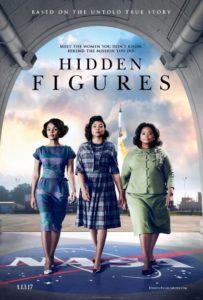
NEW YORK TIMES Interviewee Denounces Paul Kersey Piece On HIDDEN FIGURES Myth
By Eugene Gant
02/03/2017
See also by Paul Kersey: Why Not A Movie About Jack Crenshaw? — The White Man Who Actually Did What HIDDEN FIGURES Credits To Black Women
Uh-Oh. The New York Times has thrown down the gauntlet. At VDARE.com

It features an interview with Octavia Spencer about her role as Dorothy Vaughan in "Hidden Figures," which details the role black women supposedly played in the Apollo space program and getting man to the Moon.
Madame Spencer is miffed that some people are skeptical about the role that heretofore unknown black women played in the Moon shot. Yet out of a nearly 700-word interview, Spencer spent only 12 discussing the skeptics:
You’ve been talking about this film for nearly a year now. How do you keep it fresh?It will always be fresh. All I am is an actor. These are people contributed to space. There are a few idiots out there who think it didn’t happen.
The NYT headline? “Octavia Spencer Condemns Trump Followers Who Reject ‘Hidden Figures.’”
The story linked to Paul Kersey’s piece from December: Hyped Figures: John Glenn And The PC Myth Of Katherine Johnson–Unsung Black Women Were NOT What Got Us To The Moon
It appeared the same day as a piece in Slate pondering this question: why so many people think the inventor of the cotton gin, Eli Whitney, was black. (For an answer, see Steve Sailer’s post).
I never thought Whitney was black, but apparently schools across America have been teaching this falsehood for years, despite there being no textbooks that contain the falsehood.
Slate:
But it appears that thousands, maybe millions, of Americans have grown up believing otherwise. There seems to be no geographical locus for the misinformation. Commenters from Georgia, California, Kentucky, Indiana, Ohio, Virginia, Kansas, Florida, and Massachusetts insisted online on Wednesday they had been taught in school that Whitney was black. Older examples of this conviction are as plentiful as cotton bolls on a Georgia plantation: Here’s a woman indignant that Ball Park depicted Whitney as white in a TV ad. “Eli Whitney was a slave,” writes a contributor to a forum on black issues. “Name five important black people from history beside Rosa Parks, MLK Jr., Eli Whitney or Malcolm X,” a Reddit contributor requests. On another Reddit thread, commenters commiserate over their shared false memory of Whitney’s race. As of this writing, 55 percent of respondents to a BuzzFeed poll posted Wednesday say they have always believed Whitney was black. “I always knew he was white, but I always knew people who thought he was black,” says Chris Hartig, who took this photo of a poster in his Illinois high school back in 2012:
If they did believe in Whitney as a black hero of invention, it might be because plenty of authoritative sources told them as much. For example, here’s a Head Start classroom in February 1990 learning about “Black people from history” including Martin Luther King Jr., Willie Mays, and Whitney. The 1989 KRS-One song “You Must Learn,” an anthem on education and empowerment, lists Whitney among black inventors such as Garrett Morgan and Madame C.J. Walker. The video shows black men turning bales of cotton, over the mention of Whitney’s name.Schaumburg High School’s highest and lowest point. #FebruaryIsBlackHistoryMonth pic.twitter.com/vdu2Jg4cNr
— Chris Hartig (@C_Hart44) February 3, 2014
How is this possible? My guess: For the same reason we get many black invention myths. Blacks need them to validate their place in American society. Thus, blacks invented blood transfusions, air conditioning and traffic lights.
Slate suggests another reason in this case: “The irony of a black man inventing the tool that helped turn slavery into the economic engine of the antebellum South is just too poignant to resist.”
Another case of a tale “just too poignant to resist” was an episode of M*A*S*H that reprised the myth about Dr. Charles Drew, who died after he was mangled in car wreck. Drew was the father of Washington, D.C.’s Charlene Drew Jarvis.
As I recall the episode, in teaching a wounded GI who was receiving a blood transfusion not to be a racist, Hawkeye Pierce explained that Drew invented the procedure, but died after a car wreck because white doctors denied him his life-saving treatment.
The tale Pierce told contains two myths: the black-invention myth and the Jim-Crow-Killed-Drew myth. Drew pioneered blood banks, not blood transfusions, and he did not receive a transfusion because his injuries were so great the treatment was pointless. Jim Crow and racism had nothing to do with it. His family was highly appreciative of the doctors’ efforts save Drew’s life.
